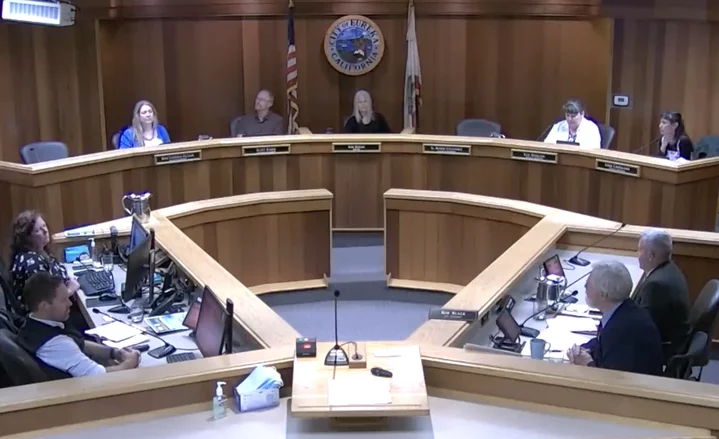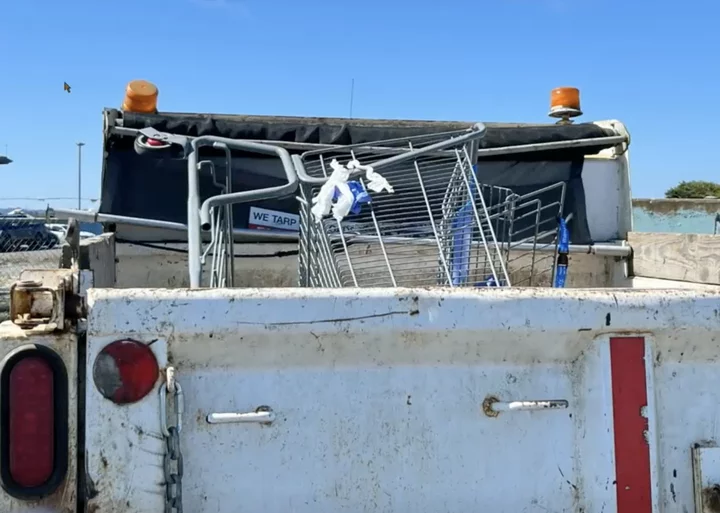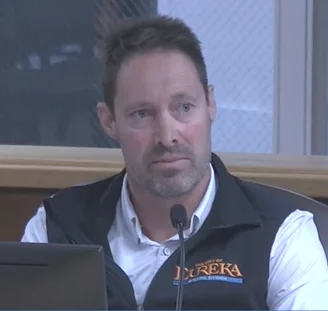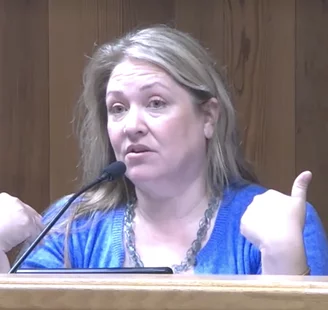Screenshot of Tuesday’s Eureka Council meeting.
###
Following yet another enduring discussion over abandoned and stolen shopping carts, the Eureka City Council on Tuesday voted 3-2, with councilmembers Renee Contreras-DeLoach and G. Mario Fernandez dissenting, to approve an ordinance that holds retailers accountable for carts scattered around town.
The ordinance — linked here — amends the city’s municipal code to allow staff to return abandoned shopping carts to the grocery stores and retailers that own the carts, rather than sending them to the landfill or salvage yard. Under the city’s current policy, retailers are subject to an $80.34 per-cart fine to cover the cost of retrieval and disposal, but it hasn’t been enforced in the last year. The city will roll out a new tagging, tracking and billing system to streamline the process. Retailers with tagged carts will be billed at the end of each month. Repeat offenders may face additional fines.
One of the many shopping carts sent to the dump by city staff. | Photo: City of Eureka
During the council’s last cart-related discussion, Councilmember Fernandez asked if the city could base the fines on gross earnings or the locality of the business to target big box stores rather than small businesses. At last night’s meeting, City Attorney Robert Black said he looked into it, but felt it was out of the city’s jurisdiction.
“You’re not really in a position to single out one level of business … [based] on the size of the business,” Black said, adding that the city cannot use a fee to generate revenue that exceeds the cost of staff time. “[T]he cost to recover and return the carts is gonna be the same for a small business or a large business, and therefore, this cannot be charged as a fee. The only other option would be to make it a tax, but then that has other implications and requires a vote of the people.”
The council also discussed the possibility of giving retailers a “freebie” and not issuing fines for the first five carts recovered. The idea was entertained, but it didn’t go anywhere.
Councilmember Kati Moulton asked how often staff pick up shopping carts, and whether cart pick-up was focused in certain areas or across the city.
“We are constantly trying to keep them cleaned up,” said Chief Building Official Brendan Reilly. “It’s an everyday thing.”
Councilmember Contreras-DeLoach expressed many of the same concerns she had during the council’s previous discussion, namely, that the ordinance would unfairly target businesses experiencing rampant theft. “It seems like we’re penalizing businesses for something that they — assuming that they’ve [implemented] precautions — have nothing to do with,” she said.
“We have a situation where somebody who’s just doing business is being victimized,” she continued. “They’re being victimized by shoplifters, they’re being victimized by people who are stealing their carts, and then we’re like, ‘We’re gonna charge you a fee for that.’ I think the impression from some of the people I’ve talked to is that it’s another move in a series of moves by the city that is not friendly to business and does not understand the pressures that they’re under or … that they’re being victimized by crime pretty continually and that that’s significantly affecting their bottom line.”
Mayor Kim Bergel asked Councilmember Contreras-DeLoach who should pay for the cost of cart recovery/return if not the businesses. “Do you feel … that the general population should be paying for that out of the General Fund, that our taxpayers should be paying for that?”
“I think we already do in a lot of indirect ways, with the expansion of law enforcement … because of the amount of issues that we’re dealing with,” Councilmember Contreras-DeLoach responded. “So yeah, I guess in a lot of ways I see this as kind of … a roll-in.”
Councilmember Fernandez aligned himself with her position, adding, “I find that disingenuous [and] inequitable to the smaller businesses that are already trying to do right by this, and I can’t fathom why I would want to move forward with it.”
Councilmember Leslie Castellano reminded her peers that the question before the council was not about the fines, but whether staff should be allowed to return stolen carts to retailers.
“Just to say, if we do not pass this, there is an existing ordinance on the books that will still charge a fee to business owners, it just won’t return the carts,” she said. “This is not changing the fee; this is actually allowing us to return the carts to business owners.”
Councilmember Contreras-DeLoach asked if staff had any approximation of how much time staff spent on cart collection every week. City Manager Miles Slattery said staff had factored in staff wages and the cost of bringing carts to the dump when the fee was implemented, but he couldn’t say how much staff time had been spent on cart collection.
Riley noted that staff haven’t been focused on cart pick-up in recent months, but estimated that he could “easily get 20 a day.” He added that the majority of carts are coming from “just a few” businesses.
“I can’t even speak to all of what other departments pick up because right now we don’t have a centralized way to track stuff — that’s part of what we’re trying to do,” Riley said. “Last Friday, I picked up three. … And we haven’t been [picking up as many as we could] because we’re waiting to implement this [ordinance] so we can keep better track and try to forge things going forward.”
Riley added that he would be happy to come back to the council with an update in the coming months.
After a bit of additional discussion, Councilmember Castellano asked to “call the question,” a parliamentary procedure used to end a debate on an ongoing issue and bring the matter to an immediate vote. She requested that staff come back with a progress report in six months.
The ordinance passed in a 3-2 vote, with councilmembers Contreras-DeLoach and Fernandez dissenting.




CLICK TO MANAGE